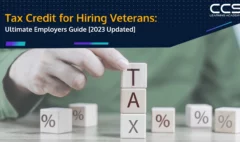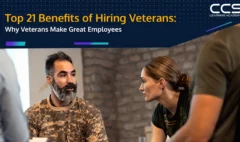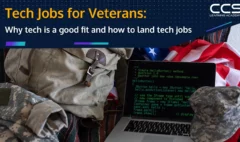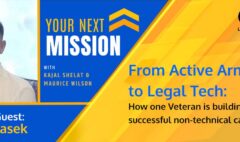Your Next Mission Episode #1: How Can Transitioning Vets Find Their Next Mission?
Welcome to the first episode of CCS Learning Academy’s podcast, Your Next Mission. Designed to help Veterans craft their civilian lives, today’s podcast features Maurice Wilson, founder of the popular REBOOT workshop. Learn the ethos for REBOOT and how it has helped thousands of Veterans make a successful transition to civilian life.
Your Hosts
Kajal Shelat is CCS Learning Academy’s Business Development Manager. She holds a Master’s degree in Business Administration and has 10+ years in the education and professional training sector. She specializes in developing sustainable partnerships and implementing technology training solutions for private and public entities. She uses her passion for education and business to keep our programs current, engaging, and relevant to today’s professionals.
Maurice Wilson is on CCS Learning Academy’s Board of Advisors. A retired Navy Master Chief Petty Officer with 25 years of service, Maurice is the President/Executive Director of the National Veterans Transition Services, Inc. (NVTSI), a non-profit organization he co-founded with retired Rear Admiral Ronne Froman after serving as an advisory member for the Call of Duty Endowment (CODE).
Transcript
Kajal: Welcome to the first episode of the Your Next Mission podcast. I’m your host, Kajal Shalat. I’m here with Maurice Wilson, a retired Navy Master Chief Petty Officer with 25 years of service. Maurice is the president and executive director of the National Veterans Transitioning Services Incorporated and REBOOT, a nonprofit organization that he founded, Maurice.
Maurice: It’s a pleasure to be here, Kajal. Thank you.
Kajal: Thanks so much, Maurice. We’re really here to tell the veteran’s story. As we get into this, I want to ask you about your story and how have you got to where you are today, and maybe a little bit about REBOOT and things that you’re currently doing.
Maurice: My story is like so many other veteran’s story. I joined the Navy in 1973 went to boot camp. After boot camp, I went to Navy Hospital Core School in Great Lakes, Illinois where I became a Navy Corpsman. I ended my first duty station in New Port, Rhode Island. From there, I had a really great military career. I learned the culture, how the system works, and had a great time. It was a very unique experience. but I will say this, when I first went in – and this is the common story for all of us – I really didn’t know what I wanted out of life. I didn’t know what I wanted to do with myself. I was looking for a direction. Joining the Navy instantly gave me that. It gave me an identity, it gave me a mission, and it gave me a career. Just like I was off to the races.
There were ups and downs, but I enjoyed being in the military. But then the day came for me to leave, take off that uniform, and I was scared. I really didn’t have a clear vision of what I wanted to do post-military. I’d lived in this ecosystem for 26 years. That’s all I knew. That’s the world that I understood. I knew how things worked. I had that figured out, but I didn’t have me figured out in terms of my identity. I surely didn’t have the whole career thing figured out when I got out.
Instead of following all of the training I had, I was a hospital corpsman with a bachelor’s degree in Business and a Master’s in telecommunications systems management, I went to work for a community-based non-profit. Because what they were offering, which wasn’t a lot of money, was a chance to help people. That’s where I ultimately evolved to. I wanted to give back. It wasn’t so much, “Hey, I want to make all this money,” I was in the service mode.
That journey took me through a lot more lessons, some painful, and took roughly 10 years after getting out to finally figure out what it is that I wanted to do. That’s when I started REBOOT in 2010. We haven’t looked back since. I hear that story over and over from a lot of people getting out. Not really knowing what they want to do, but knowing they don’t want to do the same thing on the outside that they did while they were serving. But they can’t tell you what it is they want to do. So a lot of people are in search of.
Kajal: Your story probably resonates with a lot of veterans who are either transitioning now or transitioned out and still trying to find their path. What do you see across the country through your work and through REBOOT? Are there lots of additional common scenarios and common issues that you’re seeing?.
Maurice: We’ve been doing REBOOT since 2010. It’s now 2021. Within this 10.5 year span, we’ve worked with thousands of transitioning service members. Obviously, there are a thousand different stories and a lot of commonalties and similarities. I think the biggest thing we all have in common is the fear of the unknown. Not being comfortable in our skin and knowing how things work. Your experiences in the military set you up for your journey as you get out. Did you have a pleasant experience while you were in? Was it traumatic for you in terms of adaptability within the military? Everybody’s story has a slightly different spin.
I like to stick with the things we have in common, which when we’re getting out, is the fear. It’s not knowing, it’s second-guessing. We call it the cognitive dissidence; where things inside of your head don’t look the same on the outside and can’t figure out how to apply yourself.
I’ll share an interesting thing we discovered in REBOOT, especially working with women veterans. As we go through the workshop and everyone discovers their new identity, everyone discovers their own personal passion, their self mission, everyone ultimately begins to figure out what it is they want to do. That’s how REBOOT is structured. But there’s so much more that people begin to become aware of. When we ask, “So what did you get out of the workshop?” We’ve heard so many times women say, “I’ve got my femininity back.” Well, in my thinking as a guy, I was like, I didn’t even know you lost it.
So, there’s many things happening to veterans that we’re not aware of. It reinforces why we’re doing REBOOT. To help them overcome those experiences, to help them find themselves, tohave them redefine their purpose and mission, and get on with their life. Because we all deserve a chance to not only serve our country, but also get on with our life.
Kajal: During the time people are in REBOOT, what kind of approaches do you take? Somebody’s coming out of the service and they’re scared and they may not say it out loud. How do you break down those barriers?
Maurice: Well, that’s exactly how REBOOT was engineered. And so I say to anyone watching this video, you will be very pleased with REBOOT because our approach is all about you. The curriculum is totally science-based. It’s been developed by a world-class, international organization called the Pacific Institute. But what makes it unique is our approach. The approach is veteran-centric. We introduce the topic, but we really want to find out what’s on your mind, what are you feeling, what’s in your head, and what’s in your heart. Then we figure out how to help you get past whatever’s holding you back. We can guide them and show them and help them, but the individual has to take that first step. They have to walk the path through the next journey.
Our approach is very basic and practical. We keep it real and very personal. The code of silence is there. It’s a very trustful, respectful environment. We take you through a process: Let’s get past the apprehension, let’s get past the fears, let’s get past the issues that are bothering you. Once we move all of those issues out of the way, then we’re able to begin moving forward. Our goal is to help that person get to the next level and then the next.
It’s interesting how the typical workshop progresses. We can tell by about the third or fourth day that everybody gets it. It becomes one of those epiphanies where light bulbs begin to come on. That cycle of thinking that a person was in, that self-talk, gets changed. They make several realizations and then they’re hungry for more. They’re on fire because they’re able to put the fear off to the side. So that’s the first thing we do. We knock that fear out.
Kajal: I have a sticky note on my desk. It says: Change happens at the speed of sense-making, by Bill Jensen. He’s one of our instructors for change management. Because if it doesn’t make sense, you can’t change behaviors, you can’t change the way you choose your identity or going to the next chapter of your life or a career. Monumental as far as transitioning out.
I’m sure in REBOOT the speed is right there, and when that change happens and the light bulb comes on, they’re on fire, they’re ready to go, they’re understanding what they’re doing and their next step in life.
Maurice: Absolutely, you can’t force anybody to do anything. They have to want to do it. That’s the beauty of REBOOT. We don’t force anybody or tell anybody to do anything. We just open their eyes. We help widen your reticular activating system.
They learn a lot of phrases in the workshop and they learn a lot about themselves, about their mind, about how the brain and the mind works. They learn about self-talk. They learn about the conscious and subconscious. They learn about the inner conversations. With that awareness comes the willingness to change a learned perception. We even get into what we call the conscious and the subconscious mind and the roles each one plays.
There’s a thing called the creative subconscious mind whose function is to make you act and believe the things you think you are. If your self-image is “this is who I say I am,” well, you’ll continue to do that until something inside you says you’re no longer that. That has to come from the inside. As soon as you say, “this is who I am,” your creative sub-conscience automatically starts to function the new way It says, “okay, now you say that’s who you are so I’m going to make sure you start acting the way you say you are.” Pretty cool stuff.
Kajal: Follow up on that. I’m in the tech sector so I always think about how we can relate this to how computers operate. Can you tell me a little bit about that? I know you brought it up in the past. I think our listeners would love to learn more about it.
Maurice: Yeah, yeah. There’s a book called Psycho-Cybernetics by Maxwell Malts. It’s one of our essential readings. In his book, Max Malts, identifies the brain and our thought process like a cybernetic organism. This means your brain and behaviors can be programmed just like a computer. There’s so much literature and research out there that says once you get the programming in you, you will continue to run that program until you have a replacement operating system.
When you’re a civilian prior to the military, you have a certain operating system or cultural belief that you operate from. It doesn’t work inside the military. So there’s a thing called boot camp. When you go through this re-programming scenario, the neurons in your brain are re-written. We call it the neuro-linguistic programming. You go through the bootcamp program and you graduate. Graduation day is the upload and reset process. The next day, you start your new military program. But then you get out.
Rarely does anyone go through a re-programming scenario when they leave the military. So we came up with REBOOT, which is reverse bootcamp. And there’s a reason why REBOOT takes three weeks. Scientifically, it takes three weeks to form a behavior or a habit. That’s how long it takes the system to really become a routine. So REBOOT is 21 days long. After those three weeks, the individual finishes the workshop and there’s a graduation. The person REBOOTs under the new operating system and they’re moving on with their life.
Kajal: I love that analogy. What does it the podcast title, Your Next Mission mean? What would is this podcast all about?
Maurice: To service people, your next mission is key. Ask the veteran, “whose mission are you on today?” We know when you’re in the uniform, you’re on the military’s mission. That’s what bootcamp is all about. Getting you on that page. We call it internal and external motivators. In the military, we’re driven by the external locus of control. The military says, “this is your mission.” It drives your motivation. It’s an energy force that keeps us on point.
However, when you leave the military, this is one of the struggles a lot of people have. I often have this exchange:
“So, hey, you getting ready to get out?”
“Yeah, I’m getting out really soon.”
“Are you excited?
“Yes, I am.”
“What’s your next mission?”
And people get quiet, like, “uh, get a job?”
What happens if you don’t get a job? If you don’t have a mission, if you don’t have a purpose that drives you every day, what do you do? Why do you do anything if you don’t have a mission?
Inside our brain there’s this part of us that needs the next mission or the next focus, the next goal. We’re teleological. That means we’re goal-seekers. In order for my brain to function, for me to function, I have to have a goal/mission.
In the military, your goal is the mission of the military. When you walk out, you have to come up with your own mission. Now it’s personal. It goes from external locus control to internal locus of control. I always ask Veterans, “What’s your next mission?” If you can’t answer that, then that tells you why you’re exactly in the position that you’re in. Because all your systems – your brain, your functions, – all center around having a mission.
So the title, Your Next Mission, is appropriate. Everything centers around having a mission or go. Call it a mission, call it a go, or call it a vision, but you have to have one. Your brain needs it in order for you to function normally.
Kajal: What are we going to do during this podcast to help individuals who are listening to think about their next mission?
Maurice: First I want to make sure as many people as possible enroll in the REBOOT workshop. That’s the best thing anyone can do.
If they don’t have time, over the next few podcasts we’ll introduce you to the different units. Ultimately we’ll go through the entire REBOOT curriculum, which is roughly 60-70 units,. It’s better if you get it in three weeks because then it really makes sense, but you can always come back to the podcast.
We’ll teach you how to overcome the most challenging obstacle, which is your inner self, your inner talk, your self-talk. (The one person who always gets in my way is me.) We’ll show you how to get out of your own way to be successful.
Kajal: We’re going to tell stories too. It’s not just Maurice and me chatting away. We’re going to bring in transitioning vets who either have gone through REBOOT or are in REBOOT or thinking about REBOOT. We’ll hear their stories and learn from them.
Maurice: Stories are powerful. We’ll hear people’s different stories, we’ll do some exercises because sometimes you have to see things to believe things. So we’ll show you some exercises that prove exactly what we’re saying. We’re going to help you figure out how to find you, how to find your identity, how to identify your career DNA, how to feel comfortable in your own skin. These are the things people specifically veterans. yearn for. We’re going to expose you to think tanks and other events and activities. We’re going to introduce you to some really cool apps that are mind-blowing. We’re going to give you all of the answers that you’ve been looking for since you took that uniform off.
Kajal: We’ve got some good stuff on future episodes so definitely tune in.
So I want to change it up a little bit. As a global IT company, we recognize there is a vast amount of talent readily available in those who are transitioning from the armed forces. Any thoughts on why transitioning veterans should be interested in working in the digital economy and the IT sector from what you know from listening to veterans?
Maurice: We live in a digital economy. The future of work is changing in front of your eyes. It behooves all of us to understand technology, to master it, and integrate it into our life. There are intrinsic reasons, there are extrinsic reasons. Obviously, there’s going to be a shift to artificial intelligence and automation. It’s going to change everything. The world of robotics is kicking in like you would not believe. The list and reasons are infinite. We are living in a more advanced technological society. So, if you’re going to live in the future, which all of us are, there’s no way to get around it. Embrace technology, learn new technology and figure out where you fit. We’re going to help you figure out where you fit. Then we’re going to help you plot out pathways to get there. You’re going to find everything you need right here at this podcast.
Kajal: On every episode, we’re going to ask our guest three hot questions. So, I want to ask you, and especially as it pertains to what you’re doing with REBOOT and working with veterans, what’s your biggest fear?
Maurice: My biggest fear is that I won’t be able to reach everybody. We have something that works, has been working for 11 years. We’ve changed lives, we’ve saved marriages, we’ve helped people redefine their identity, their purpose, their passion. So for me, my mission is to ensure that every single veteran and their family, every service-connected person out there who wants to go through the workshop, goes through the workshop. That’s what keeps me up at night worrying about other people…
Kajal: You and I have talked about this before, especially because of the pandemic and the things you’ve had to change with REBOOT. You’ve gone online and you’re able to cast a wide net. I think 200,000 veterans coming out?
Maurice: 250,000 per year exit the military. If there’s a good side of the Covid 19 pandemic, it’s that it is got us to think how we could make REBOOT available digitally. So we have people enrolled in Hawaii, in Japan, in Guam. It has been a revelation because it’s given us the ability to go beyond any classroom. Now that we can do this digitally, we can now reach more people, so I’m feeling a little bit better, but I’m not happy yet because we still have 21 million people that we need to REBOOT.
Kajal: Alright, second question. What is your biggest challenge?
Maurice: My biggest challenge has always been getting others to get it. I mean federal organizations, governmental organizations, even other non-profit. You would think such a logical, simple thing, you just need to REBOOT, would be obvious. But the challenge has been getting everyone to recognize it’s that simple. But a lot of people cling to the idea that veterans need a job before they need a REBOOT. Try as I may, I’ve not been able to convince them that this is a stackable learning thing; you have to start with A, then go to B, then go to C. We’ve seen how this thing plays out if you jump straight to the jobs piece and the person hasn’t figured out their identity and their purpose and passion. In many cases, they come right back to where they are today. So, my biggest challenge is getting everybody on the same page. Boy, if I could snap my fingers and say, “folks, let’s do this, let’s end homelessness, let’s minimize all of the issues that we see facing by taking this one simple step.” Wow, we could do it.
Slowly but surely, some major groups and organizations finally got it. One group told me, “wow, after 11 years, I get it now.” It’s a challenge, but I’m up for the challenge.
Kajal: What’s your next mission?
Maurice: My next mission is a series of activities. To simplify this process as much as possible and to replicate it internationally. It’s not just the US military. Other international militaries have the same problems. So that’s one of my next missions. Once we get the United States taken care of, then I want to take REBOOT to other countries…
Kajal: That’s incredible. Big mission.
Well, Maurice, that concludes our first episode of Your Next Mission. Thank you for your time and insight today. Thanks to all our listeners for giving us your time today. We’ve got a lot more content, a lot more great things. This isn’t the last time you’ll hear from Maurice. He’s got a lot of wisdom, insight, and guidance, so stay tuned for our next episode. We’ll be talking to some veterans who will tell their story and give you some guidance as well.
If you want more information about REBOOT, CCS Learning Academy, and CCS Global Tech, go to CCSLA.com/vets. There you can take a tech test to see your potential for a technology career or the next career path you may want to take. It’s a great test to gauge where you are. Go ahead and check us out a little bit more. And we’ll see on the next episode.
Maurice: Awesome, thank you, thank you.
Are you a transitioning Veteran interested in entering the technology sector? Are you a Veteran already working in tech and want to advance your career? CCS Learning Academy can help! Our team specializes in working with Veterans and can help you map a training path that will get you the tech role best for you. Visit our Veterans’ page to learn more.







